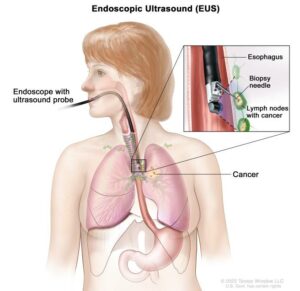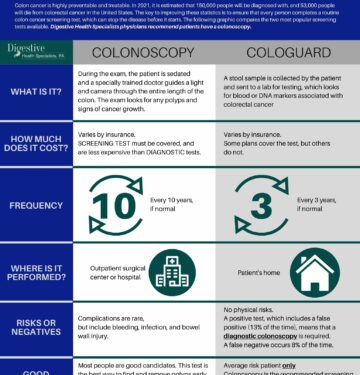Digestive Health Specialists, PA is here to help if you, or someone you know, would like more information or if you are experiencing any digestive health symptoms and would like further evaluation. Feel free to call us at 336-768-6211 or fill out the form below.
When you need an Endoscopic Ultrasonography (EUS)
You have a referral to have endoscopic ultrasonography or EUS. The first thought going through your head may be, what? And the second, why? In this article, we answer these and additional questions about EUS.
What is a EUS?

Endoscopic ultrasonography (EUS) allows your doctor to examine your esophageal and stomach linings, as well as, the walls of your upper and lower gastrointestinal tract. The upper tract consists of the esophagus, stomach, and duodenum; the lower tract includes your colon and rectum. It is also used to study other organs near the gastrointestinal tract, including the lungs, liver, gall bladder, and pancreas.

A gastroenterologist with advanced training performs the procedure. At our practice, Dr. Ingrid Gonzalez performs this procedure. She completed a 4th Year Fellowship in Advanced Endoscopy at the University of California School of Medicine, San Diego, CA.
Your Endoscopist will use a thin, flexible tube called an endoscope with a built-in miniature ultrasound probe. They will pass the endoscope through your mouth or anus to the area that needs examing. Then, they will use ultrasound to use sound waves to create visual images of the digestive tract.
Why is a EUS needed?
EUS provides your doctor with more information than other imaging tests by providing detailed images of your digestive tract. Your doctor can use EUS to diagnose certain conditions that may cause abdominal pain or abnormal weight loss.
EUS is also used to evaluate known abnormalities, including lumps or lesions, detected at a prior endoscopy or seen on x-ray tests, such as a computed tomography (CT) scan. It provides a detailed image of the lump or lesion, which can help your doctor determine its origin and help treatment decisions. It can help diagnose a disease of the pancreas, bile duct, or gallbladder when other tests are inconclusive or conflicting.
What can I expect during a EUS?
Practices vary among doctors, but for a EUS examination of the upper gastrointestinal tract, your Endoscopist might spray your throat with a local anesthetic before the test begins. Usually, you will receive sedatives intravenously to help you relax. You will most likely begin by lying on your left side. After you receive sedatives, your Endoscopist will pass the ultrasound endoscope through your mouth, esophagus, and stomach into the duodenum. The instrument does not interfere with your ability to breathe. The actual examination generally takes between 15 to 45 minutes. Most patients consider it only slightly uncomfortable and fall asleep during it.
A EUS examination of the lower gastrointestinal tract can often be performed safely and comfortably without medications; you will probably receive a sedative for a prolonged exam or if the doctor will examine a significant distance into the colon. You will start by lying on your left side with your back toward the doctor. Most EUS examinations of the lower gastrointestinal tract last 10 to 30 minutes.
What happens after a EUS?
If you received sedatives, you will be monitored in the recovery area until most of the sedative medication’s effects have worn off. If you had an upper EUS, your throat might be sore. You might feel bloated because of the air and water introduced during the examination. You’ll be able to eat after you leave the procedure area unless instructed otherwise. Your doctor, generally, can inform you of the results of the procedure that day, but the results of some tests will take longer.
Additional Questions?
If you have any questions about your need for EUS, alternative approaches to your problem, the cost of the procedure, billing methods, or insurance coverage, do not hesitate to speak to your doctor or contact us at the information below.
– Published February 1, 2023







